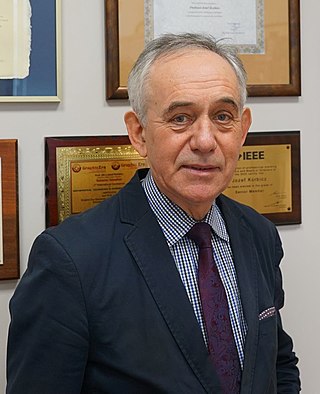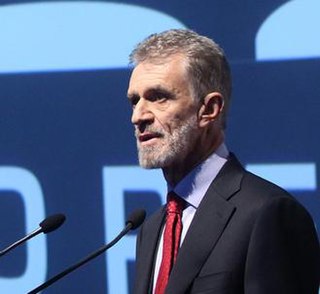Petar V. Kokotovic is professor emeritus in the College of Engineering at the University of California, Santa Barbara, USA. He has made contributions in the areas of adaptive control, singular perturbation techniques, and nonlinear control especially the backstepping stabilization method.
Harold (Hall) Chestnut was an American electrical engineer, control engineer and manager at General Electric and author, who helped establish the fields of control theory and systems engineering.
Karl Johan Åström is a Swedish control theorist, who has made contributions to the fields of control theory and control engineering, computer control and adaptive control. In 1965, he described a general framework of Markov decision processes with incomplete information, what ultimately led to the notion of a Partially observable Markov decision process.
Mustafa Tamer Başar is a control and game theorist who is the Swanlund Endowed Chair and Center for Advanced Study Professor of Electrical and Computer Engineering at the University of Illinois at Urbana-Champaign, USA. He is also the Director of the Center for Advanced Study.

Willis Harmon Ray is an American chemical engineer, control theorist, applied mathematician, and a Vilas Research emeritus professor at the University of Wisconsin–Madison notable for being the 2000 winner of the prestigious Richard E. Bellman Control Heritage Award and the 2019 winner of the Neal Amundson Award.
Miroslav Krstić is an American control theorist and Distinguished Professor of Mechanical and Aerospace Engineering at the University of California, San Diego (UCSD). Krstić is also the director of the Center for Control Systems and Dynamics at UCSD and a Senior Associate Vice Chancellor for Research. In the list of eminent researchers in systems and control, he is the youngest.

Gerd Hirzinger received his Dipl.-Ing. degree and the doctor’s degree from the Technical University of Munich, in 1969 and 1974 respectively. In 1969 he joined DLR where he first worked on fast digital control systems. 1976 he became head of the automation and robotics laboratory of DLR, where he and his co-workers soon got several awards for innovative technology transfer from robotics research to applications. In 1991 he received a joint professorship from the Technical University of Munich, and in 2003 an honorary professorship at the Harbin Institute of Technology in China.
Masayoshi Tomizuka is a professor in Control Theory in Department of Mechanical Engineering, University of California, Berkeley. He holds the Cheryl and John Neerhout, Jr., Distinguished Professorship Chair. Tomizuka received his B.S. and M.S. degrees in mechanical engineering from Keio University, Tokyo, Japan in 1968 and 1970, and his Ph.D. in mechanical engineering from the Massachusetts Institute of Technology in February 1974. He was elected to the National Academy of Engineering in 2022.
Manfred Morari is a world-leading control theorist who has made pioneering contributions to the theory and applications of Model Predictive Control, Internal Model Control (IMC) and Hybrid Systems. His book on Robust Process Control is considered to be definitive text on the subject. He is currently Peter and Susanne Armstrong Faculty Fellow at the University of Pennsylvania. He received his Ph.D. in Chemical Engineering from the University of Minnesota in 1977. Dr. Morari held positions at the University of Wisconsin, Madison (1977–1983), the California Institute of Technology (1983-1991), and the Swiss Federal Institute of Technology in Zurich ETH Zurich. He is considered a pioneer in field of Model Predictive Control, Control of Hybrid Systems, Internal Model Control (IMC), and robust control.

Detlef Zuehlke is a German engineer and professor.

Józef Korbicz is a Polish engineer and a full-rank professor at the University of Zielona Góra. Ordinary member of the Polish Academy of Sciences.
Theodore Joseph Williams was an American engineer and Professor of Engineering at Purdue University, known for the development of the Purdue Enterprise Reference Architecture.
Ji-Feng Zhang was born in Shandong, China. He is currently the vice-chair of the technical board of the International Federation of Automatic Control (IFAC), the vice-president of the Systems Engineering Society of China (SESC), the vice-president of the Chinese Association of Automation (CAA), the chair of the technical committee on Control Theory (CAA), and the editor-in-chief for both All About Systems and Control and the Journal of Systems Science and Mathematical Sciences.
Karl Henrik Johansson is a Swedish researcher and best known for his pioneering contributions to networked control systems, cyber-physical systems, and hybrid systems. His research has had particular application impact in transportation, automation, and energy networks. He holds a Chaired Professorship in Networked Control at the KTH Royal Institute of Technology in Stockholm, Sweden. He is Director of KTH Digital Futures.
Daniel M. Liberzon is the Richard T. Cheng Professor of Electrical and Computer Engineering at the University of Illinois at Urbana–Champaign.

Roberto Tempo was an Italian scientist, known for his studies on complex networked systems in information technology.
Mengchu Zhou is a Chinese-American Distinguished Professor of electrical and computer engineering in the Helen and John C. Hartmann Dept. of Electrical and Computer Engineering at New Jersey Institute of Technology (NJIT) and at Macau University of Science and Technology. He is the Chairman of IKAS Industries of Shenzhen in China and a Board Member of OneSmart Education Group headquartered in China.
Petros A. Ioannou is a Cypriot American Electrical Engineer who made important contributions in Robust Adaptive Control, Vehicle and Traffic Flow Control, and Intelligent Transportation Systems.

Emilia Fridman is an Israeli professor of Electrical Engineering in the Engineering Faculty at Tel Aviv University, specializing in control theory, time-delay and distributed parameter systems. She is an IEEE fellow for “contributions to time-delay systems and sampled-data control”.

Ali Galip Ulsoy is an academic at the University of Michigan (UM), Ann Arbor, where he is the C.D. Mote Jr. Distinguished University Professor Emeritus of Mechanical Engineering and the William Clay Ford Professor Emeritus of Manufacturing.







